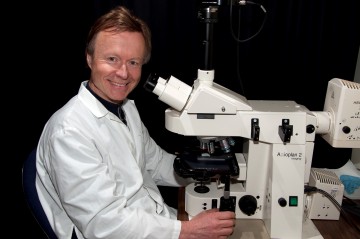University of British Columbia scientists have proven that a small number of uninjured nerve cells take over the function of injured nerve cells following spinal cord injury (SCI), a process that has been long suspected in cases of spontaneous motor function recovery.
Wolfram Tetzlaff, Director of the International Collaboration on Repair Discoveries (ICORD) and a Professor in the Department of Surgery and the Department of Zoology, investigated the role of a specific nerve pathway called the dorsolateral corticospinal tract.
Published in the Journal of Neuroscience, the study involved training adult mice to perform a task which requires them to accurately place their paws on rungs of a horizontal ladder. After SCI, the mice made more mistakes performing this task, but eventually recovered about half of their accuracy. Then, a genetic technique was used to block out the function of the dorsolateral corticospinal tract, which resulted in the mice committing errors that had appeared early after injury. When the function of the tract was blocked in a group of uninjured mice, there was little change in their performance. The results showed that this minor pathway had taken over more function following SCI.
Researchers caution that this work has only been done so far on rodents and researchers are unsure how clinically relevant the horizontal ladder task is. However, the knowledge that having even a few uninjured neurons can lead to recovery of some movement can now inform research into more effective rehabilitation strategies for people with SCI.
“The dorsolateral corticospinal tract in adult mice comprises around 400 nerve cells, compared to the 17,000 neurons that were injured, so it may be possible to see significant recovery by targeting the regeneration of a relatively small number of cells,” Dr. Tetzlaff says.
“This research shows us that we should focus on uninjured neurons as a target for therapy,” says Brett Hilton, a PhD student in zoology and lead author of the study. “Of course more work is needed, but as most SCI in humans are incomplete, and our work shows—in rodents at least—that even very small spared tracts can mediate recovery, this may be a promising target for therapeutic intervention in humans.”
